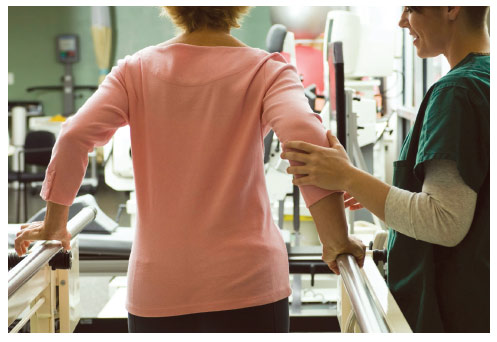The road to recovery after stroke is a long one. It often includes not only initial assessment and
treatment in hospitals but also significant time in inpatient and outpatient
rehabilitation services. Throughout this process, patients see a wide range of specialists, including acute care physicians, radiologists, neurologists, neurosurgeons, and physical and occupational therapists.
To improve care and advance the development of new treatments, Washington University, Barnes-Jewish Hospital and The Rehabilitation Institute of St. Louis have established the
Brain Recovery Core (BRC). This collaborative group ensures that each specialist who treats stroke patients at these three institutions communicates and shares data effectively.
“The BRC’s goal is to standardize, collect and share data throughout the entire course of stroke treatment,” says
Maurizio Corbetta, MD, the Norman J. Stupp Professor of Neurology at Washington University School of Medicine and clinical director of the stroke and brain tumor program at The Rehabilitation Institute of St. Louis. “We’re doing this to help us predict how challenging recovery will be for the patients and also to assess the effectiveness of our treatments in facilitating recovery.”

With a grant from The Foundation for Barnes-Jewish Hospital, Corbetta and his colleagues—including Washington University physical therapist Catherine Lang, PhD, and neurologist
Jin-Moo Lee, MD, PhD, attending physician with the acute stroke service at Barnes-Jewish Hospital—are starting their evaluation of treatment effectiveness at the very beginning. They are assessing the long-term recovery of patients given tPA, a clot-busting drug that can only be taken within the first few hours after a stroke. These results will be compared to those of stroke patients who could have been treated with tPA but did not arrive at the hospital quickly enough. In the area of prognosis, Maggie Bland, DPT, coordinator for the BRC, and her colleagues published a study in 2012 that showed testing a patient’s balance and ability to walk soon after a stroke gave a good indication of how well the patient would be able to walk a few weeks later at home.
“When we used to have patients in inpatient rehabilitation for months at a time, it was easy for the doctors to help families identify and implement the changes that the patient’s house might need—like railing on the stairs or changes to the doorways,” says Lang. “Now, patients stay in the hospital two or three weeks at most, so everything needs to happen very quickly. These sorts of indicators help us better prepare the patient and the family for discharge right from the beginning.”
Patients who received acute care for a stroke at another hospital may come to the Brain Recovery Core for rehabilitation, Corbetta notes. Doctors may call 314-362-4503 to refer a patient to the neuro-rehabilitation clinic at Barnes-Jewish Hospital, where the patient will be entered into the BRC.